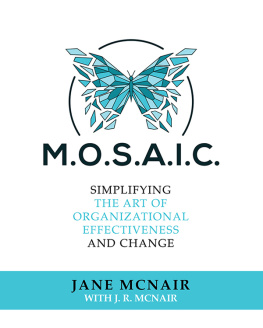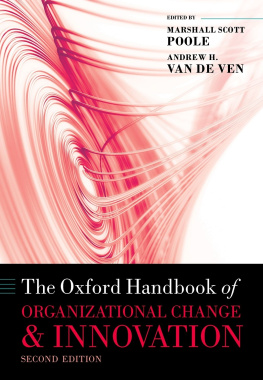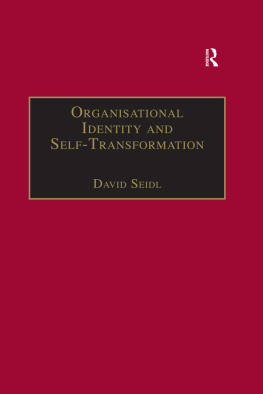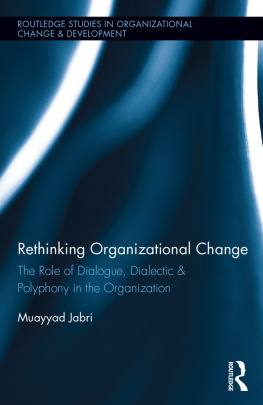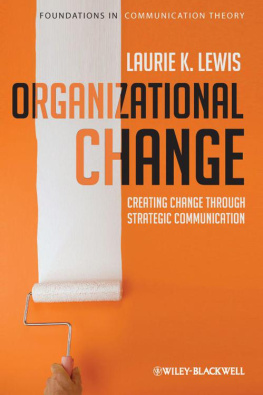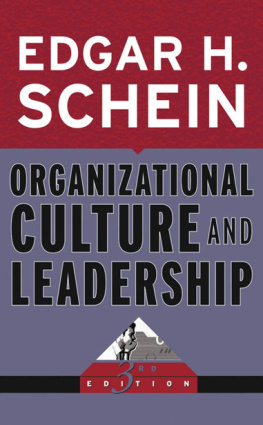ORGANISATIONAL CULTURE: ORGANISATIONAL CHANGE?
Organisational Culture: Organisational Change?
PETER ELSMORE
East London Business School
University of East London
First published 2001 by Gower Publishing
Reissued 2018 by Routledge
2 Park Square, Milton Park, Abingdon, Oxon OX14 4RN
711 Third Avenue, New York, NY 10017, USA
Routledge is an imprint of the Taylor & Francis Group, an informa business
Copyright Peter Elsmore 2001
All rights reserved. No part of this book may be reprinted or reproduced or utilised in any form or by any electronic, mechanical, or other means, now known or hereafter invented, including photocopying and recording, or in any information storage or retrieval system, without permission in writing from the publishers.
Notice:
Product or corporate names may be trademarks or registered trademarks, and are used only for identification and explanation without intent to infringe.
Publishers Note
The publisher has gone to great lengths to ensure the quality of this reprint but points out that some imperfections in the original copies may be apparent.
Disclaimer
The publisher has made every effort to trace copyright holders and welcomes correspondence from those they have been unable to contact.
A Library of Congress record exists under LC control number: 00135327
ISBN 13: 978-1-138-73484-5 (hbk)
ISBN 13: 978-1-315-18691-7 (ebk)
Contents
When organisations change there seems to be anguish experienced by organisational members - and this is not necessarily confined to those people who occupy the lowest rungs on the status and power ladder. Anguish is evidenced in uncertainty about the future, for individuals and for whole groups of people. For example, amongst manual workers in the telecommunications industry, there is little demand for people whose work skills are based solely in line technologies in an age of fibre optics. The voice of pain is audible in a number of the interviews that led to the construction of of this book. So, a primary purpose in writing this was to give the room to make the voices more audible than they would otherwise have been.
This work is an empirical and theoretical investigation of the links between organisational cultures and organisational change, in two large businesses that have been privatised. The empirical work principally comprised the interviewing of seventy-two mostly middle ranking or more senior officials. The methodological approach has been largely rooted in interpretative theory. The theoretical argument ranges over issues in the social theory of work, and labour process. The orientation taken is largely critical, in sympathy with Willmott (1993).
The conclusions show that attempts to change corporate cultures on a massive scale are very difficult to achieve, in the organisations studied, certainly in the short and medium terms. So, what actually happens when culture change is instigated, from the perspective of middle and low ranking organisation members, is that there are unintended outcomes. Relatedly, then, the reality of day to day life may endorse the view that these new corporate cultures are the creatures of those who create and sustain them. Their sometimes baleful influences originate at the highest echelon of an organisation, but such influence pervades the working lives of all organisation members and this will include the members of sub-cultures and any anti-cultures existing within the organisation as a whole. When members of senior management groups attempt to change the culture of their organisation, more junior organisation members may see what they do as exploitative. This is in the sense that more demands are made of them in terms of hours at work and levels of skill and commitment required but the context is where rewards for most people are severely curtailed or halted altogether.
One part of this prevailing reality (as identified through the eyes of the middle and lower grades of white-collar workers) is that local anti-cultural groups may have power levels similar to supporters of the officially promulgated locally new culture. However, in spite of almost everything, the evidence of this study indicates much loyalty to senior managements. The everything just mentioned includes the lack of recognition by a number of the managers in post of the motivating power of non-pecuniary rewards and so their consequent under-emphasis of such rewards. Loyalty continues to be extended when senior managements seem to lack clarity in the messages they send about why their people fail to be promoted - and may even continue after the person has been severed from the organisation.
The two organisations studied in the empirical element of this work are British Gas (Eastern) Ltd. and British Telecommunications plc. Very sincere thanks are due to senior colleagues within each organisation for their sponsorship, and also to the many voices within each that kindly consented to speak to me and so made this study possible. Both are very large organisations and, of course, so much water has passed under each bridge between the time of executing the interviews and the middle months of this year, 2000, that substantial changes have taken place between that which is described and analysed and that which presently is. For example, British Gas (Eastern) no longer exists as a company, as the study was conducted before the wholesale national reorganisation of the gas industry. Similarly, in the case of BT, many of the working arrangements of that organisation bear only small resemblance to that which prevails today. I leave to the judgement of others the extent to which that detracts from this study.
Perhaps this is the point to offer equally sincere thanks to a large number of friends and colleagues. There are very many to name. Firstly, I must thank Christine my wife, and Helen my daughter. I understand that the conventional phrase at this point is typically without whose inspiration this work would never have been completed. If that is the convention, then never has it been more appropriate than to apply it here. This book has grown from doctoral work supervised by Professor Hugh Jenkins. Hughs scholarly outlook and zest for the topic were so important to this piece of research. Thanks also are due to a number of colleagues - Dr Jim Barry who convenes the Organisation Studies Research Unit within the University of East London; Mr Phil Knowles, until recently Dean of the East London Business School and Professor Kazem Chaharbaghi, Director of Research in the School.
The germ of the idea originated in the early years of the last decade when I was a manager in one branch of one part of the public services: to all my former colleagues another thank you is due. Final thanks go to Avalon Associates of Chelmsford for final checking, formatting and preparation of camera-ready copy, and Anne Keirby and her colleagues at Ashgate Publishing Limited.
Academically, professionally and personally, in spite of the best efforts of a significant number of people - including many who are not identified above - errors of fact or judgement may be ascribed to this book. I take responsibility for all of this.
Peter Elsmore
This work has a clear objective: it seeks to examine and understand the organisational cultures of two large organisations. Coupled with this, it attempts also to examine and understand processes surrounding the ways that these organisations changed in the middle of the decade of the 1990s. In so doing, the study raises a number of significant theoretical, methodological and operational dimensions that arise directly from the studys empirical investigation. They are treated in more detail at appropriate places throughout the work as a whole, but their identification and exploration begins in this chapter. The cultural analysis of the two organisations is a worthwhile objective in the context of the middle and late 1990s in Great Britain, because the two organisations were formerly in the public sector. However, at the time of presentation of this study they have each been part of the private sector for more than ten years. In the early and middle years of the 1980s each organisation became subject to fundamental review as a consequence of the privatisation measures of the Conservative political administrations of that time. Each of these internal reviews, following on from the government statutory intervention, identified the need to render each organisation studied much more accountable to a number of constituencies (of course, a number of other organisations that were not part of this study faced a similar task as a consequence of similar privatisation measures). So, attempting to understand what happened as a result of the impact of enforced organisational change is judged to be an interesting task.



